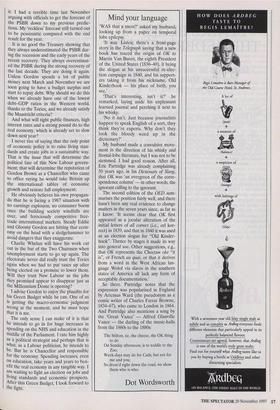Mind your language
`WAS that a snort?' asked my husband, looking up from a paper on temporal lobe epilepsy.
`It was. Listen, there's a front-page story in the Telegraph saying that a new book has traced the origin of OK to Martin Van Buren, the eighth President of the United States (1836-40), it being the slogan at his unsuccessful re-elec- tion campaign in 1840, and his support- ers taking it from his nickname, Old Kinderhook — his place of birth, you see.'
`That's interesting, isn't it?' he remarked, laying aside his unpleasant learned journal and perching it next to his whisky.
`No it isn't. Just because journalists happen to speak English of a sort, they think they're experts. Why don't they look the bloody word up in the dictionary?'
My husband made a convulsive move- ment in the direction of his whisky and frontal-lobe literature, but I was not to be stemmed. I had good reason. After all, Eric Partridge was already complaining 50 years ago, in his Dictionary of Slang, that OK was 'an evergreen of the corre- spondence column' — in other words, the ignorant calling to the ignorant.
The second edition of the OED sum- marises the position fairly well, and there hasn't been any real evidence to change matters in the seven years since, as far as I know: 'It seems clear that OK first appeared as a jocular alteration of the initial letters of all correct (i.e., orl kor- rect) in 1839, and that in 1840 it was used as an election slogan for "Old Kinder- hook". Thence by stages it made its way into general use. Other suggestions, e.g., that OK represents the Choctaw oke "it is", or French au quaff, or that it derives from a word in the West African lan- guage Wolof via slaves in the southern states of America all lack any form of acceptable documentation.'
So there. Partridge notes that the expression was popularised in England by Artemus Ward (the pseudonym as a comic writer of Charles Farrar Browne, 1834-67), who came to London in 1864. And Partridge also mentions a song by the 'Great Vance' — Alfred Glanville Vance — the darling of the music-halls from the 1860s to the 1880s:
The Stilton, sir, the cheese, the OK thing to do On Sunday afternoon, is to toddle to the Zoo.
Week-days may do for Cads, but not for me and you; So dress'd right down the road, we show them who is who.
Dot Wordsworth


















































































 Previous page
Previous page